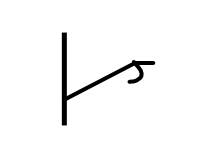Tuqaq
| Tuqaq Temur Yalig | |
|---|---|
| Bey | |
| Died | c. 924 AD |
| Issue | Seljuk Beg |
| House | Oghuz Yabgu |
| Father | Kerequchi |
Tuqaq (Arabic: دوقاق دمور یالیق or Duqaq Template:Lang-tr Turkmen: Dukak beg or Dukak Demir yaylı; full name: Duqaq Temur Yalig) was a subashi (commander-in-chief) in Oghuz Yabgu State[1] and the father of Seljuq, eponymous founder of the Seljuk dynasty. His great-grandson Tughril beg established the Great Seljuk Empire in the 11th century.[2] "Tuqaq Temur Yalig" literally means "iron bow" or "with an iron bow" in old Turkic.
Origin
Little is known about Tuqaq or his early activities. Most of the details are uncertain and come from later written or oral sources, particularly after the Battle of Dandanaqan. However, it is generally assumed that he and his prominent descendants belonged to Kınık tribe of the Oghuz Turks.[3]75–76 His father's name was Kerequchi. He was either a popular local blacksmith or a master of tent-making (yurts). Somewhat reliable sources state that Tuqaq was in the Oghuz Yabgu State's military service in the latter stages of his life and held an important role among the Oghuz Turks. His nickname "Iron Bow" suggests that he was no ordinary soldier. Arrow and bow are considered a "sign of sovereignty" in Oghuz culture, and given his nickname—Duqaq—he was perhaps the commander-in-chief of the Oghuz army, or a powerful statesman. He most likely had tremendous power and influence in the Oghuz Yabgu State.[4]
Affiliations

The Persian epic Maliqnamah (Book of Kings) mentions a warrior called Tuqaq who served a Khazar Khagan (emperor). It is possible that Tuqaq served the Khazars before the catastrophic collapse of the Khazar state, the result of pressure by the Cumans[5] and then allied with the Oghuz Yabgu state where he remained for the rest of his life.[citation needed]
Though Tuqaq was an important figure in Oghuz Yabgu, it is known that he had a sour relationship with other influential state leaders as he objected to their policy of raiding other Oghuz tribes (Turks).[6] Tuqaq's son, Seljuk, likely held similar views. This may have triggered other Turks within the Oghuz Yabgu state to join the Kinik tribe of Seljuk when they split from Oghuz Yabgu and moved to a new homeland in Transoxiana in the vicinity of Merv. This would take on considerable importance as the Seljuk Turkomans became a formidable force in the region, enabling them to challenge the Ghaznavids and thus begin their rapid progress in becoming a powerful empire.[citation needed]
Tuqaq is believed to have died in 924. After his death, his son, Seljuk, was named commander-in-chief of the Oghuz army.[7]
In 961, Seljuk left the Oghuz state with his goats, sheep, and horses and travelled to Mawarannahr with his Kinik and some other Oghuz tribes. After he and his tribe loosely adopted Islam, and later refused to pay taxes to the Oghuz Yabgu State because they were not Muslims, they founded their own independent beylik (small country).[7]
See also
References
- ^ Refik Turan, Selçuklu Tarihi El Kitabı (Seljuk History Handbook), published by Grafiker Yayınları, 2018, p-27
- ^ S.G.Goodrich, "Modern History, from the Fall of Rome, A.D. 476, to the Present Time", published by Morton and Griswold, page-112: "In year 1042, Togrul beg, a Turkoman chief, of the tribe of Seljuk, having made himself a master of Khorasan..."
- ^ Jackson, P. (2002) "Review: The History of the Seljuq Turkmens: The History of the Seljuq Turkmens." Journal of Islamic Studies. Center for Islamic Studies, Oxford. 13 (1):
- ^ Turan & Özgüdenli 2018, p. 27.
- ^ "Epic of the past years". Epic of the past years (in Russian).
- ^ Herth, William (2005–2007). The Secret Alchemy of Mary Magdalene. Ormus Publications and Booksellers LLC. p. 224. ISBN 0-9793737-0-0.
- ^ a b The Mystic Alchemy of Mary Magdalene. Ormus Publishers and Book Sellers LLC-9793737-0-0. 2007.
